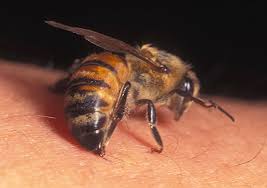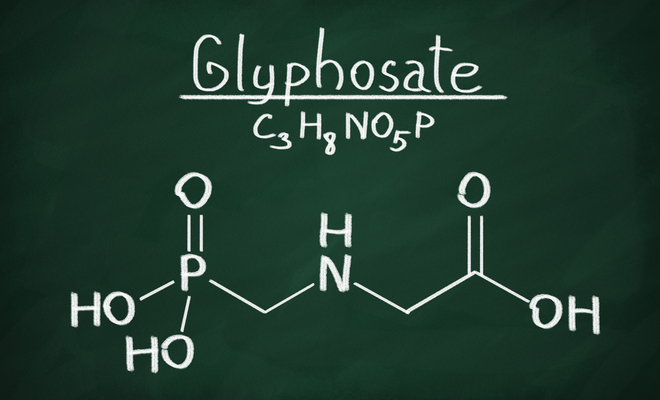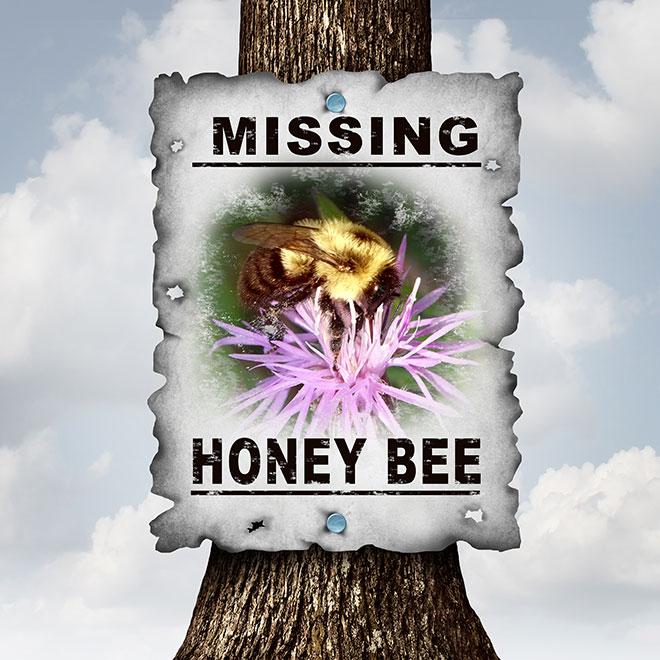I do not have a green thumb. (I’d say I had more of a brown thumb, but that doesn’t sound quite right.) Anyway, I just can’t grow anything in my garden. My wife has better success, but really works at it, too. The other morning, I went outside and observed my wife inserting a tiny paintbrush into an equally tiny flower on one of the garden plants. While eccentric behavior is the norm in our household, I had to ask why she was tickling our tomatoes while in her bathrobe. Continue reading “At this point, I’d welcome a bee sting”
Month: March 2017
Glyphosate “GLY” Danger – Nothing to See Here?
After starting my research on the potential impacts of the weed killer, glyphosate (“GLY”) as found in Roundup® and others, on bees, and then, dogs, I ran across some interesting test results that hit a little closer to home. Moms Across America(1) (“MAA”) and Sustainable Pulse(2) (“SP”) started looking at the amount of GLY in breast milk, urine and water according to a report posted in April 2014. MAA is a non-profit organization “seeking to raise awareness about GMOs and related pesticides in our food.” SP is “owned and maintained by a group of concerned citizens and scientists.”
Perfect. I am concerned about being aware.

Continue reading “Glyphosate “GLY” Danger – Nothing to See Here?”
But, My Dog Won’t Eat Yogurt
When I first wrote the article concerning the disappearance of the bees around my house and a potential link to glyphosate, my thoughts went to my beloved dog, Sam, a one-eighth purebred Lab (seven-eighths “other”). If bees can potentially develop “gut issues” from exposure to glyphosate, how about our pets? We spray undesirable plants with glyphosate to kill them. Cats eat grasses and plant material to address their own private hell of hairball digestive issues. (Yuk.) And dogs eat almost everything that cats leave behind. Is there a connection?
Glyphosate, the weed killer brought to market as Roundup® in 1974, is officially classified as an antibiotic. (That’s a bit strange to me, but there it is.) Antibiotics generally cause havoc on bacteria. If it is suspected of negatively hitting our bee population by upsetting their gut flora, could it also be upsetting the intestinal balance in my best buddy by killing off his good digestive tract bacteria? Simply put: A little more regularity in his schedule would be welcome. (“I need to walk. Right NOW. Bring a leak-proof bag. OK. Better now. Thanks. We’ll do it again in a half hour.”)
A quick look online and you find research done by Samsel and Seneff in 2015 that found “significant levels” of glyphosate and their metabolites in many popular dog and cat foods.(1)
Wait. Dog food directly contains a weed killer/antibiotic?
It turns out that the harvesting of many grains now includes spraying them with glyphosate to speed up harvesting. This practice has nothing at all to do with weed control.
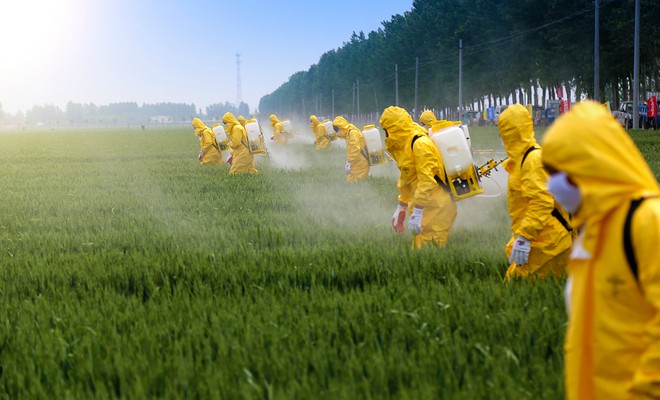
Back in 2013, Samsel and Seneff proposed research that identified glyphosate as the most important causal factor in the growing problem of celiac disease whose symptoms include nausea, diarrhea, skin rashes, anemia, and depression. Celiac disease is associated with imbalances in gut bacteria that can be fully explained by the known effects of glyphosate on gut bacteria.(2)
These “gut bacteria” concerns are now hitting closer to home with our pets. Recent research has indicated that more attention is being paid to adding probiotics to dog food to offset the antibiotic impact on digestion. I am always wary of marketing ploys to simply differentiate products, but this potential “glyphosate impact” question may explain some of Sam’s issues.
And with all the drool Sam and I share on a daily basis, I’m now interested on a personal level.
Probiotics counteract antibiotics. Easy word recognition here. I get that. So, it seems we need some more good soldiers on our team. Back in 1998, The American Society for Nutrition Services published research on the use of probiotics in a dog’s diet and found that certain strains of good probiotics can survive the digestion process in dogs. (3)
Just like us, the “good bacteria” colonize in the dog’s large intestine and take over so there is no room left for the types of bacteria that make your pet sick. The “good bacteria” also provide easy-absorbable energy to help pets digest food and absorb nutrients, antioxidants, and iron. In fact, the addition of probiotics to your pets’ food can help stop diarrhea, stimulate firm stool, and reduce inflammation if your pet has Irritable Bowel Disease (IBD).
In addition to helping with digestive issues, probiotics in dogs actually activate the canine immune system. Probiotics help increase natural antibody levels and macrophage activity in dogs, as well as regulate and increase hormone levels. If the “good bacteria” is depleted or the balance of it is disturbed, pathogenic bacteria can overgrow and cause health problems. By preventing harmful bacteria from colonizing, probiotics can prevent digestive problems and support your pets’ bodies in fighting illnesses and diseases.(4)
Figuring out how to treat the on/off issues of my dog’s digestive tract requires patience, I realize. And, we’re in this together. It is not always known what actually causes this irritable bowel syndrome, but some of the suspected factors are thought to be related to diet intolerances, possibly due to allergies, the ability of the food to effectively pass through the gastrointestinal tract, and, possibly, mental distress. Irritable bowel syndrome in dogs is commonly associated with chronic inflammation and discomfort of an animal’s bowels; however, it is not linked with any type of gastrointestinal disease.(5)
So I always seem to circle back to something causing a disruption in my dog’s digestive “process.” I need to research the potential benefits, if any, of liquid versus solid probiotics. It seems that if you see the names Lactobacillus, Bifidobacterium and/or Enterococcus listed, and spelled correctly, as probiotics in your dog’s food, you may be on the right track. There is some disagreement of the strains of probiotics needed by pets as opposed to what their owners might need. Probiotic formulas used by humans were developed specifically to fortify the bacterial species found in the human GI tract. Pets have some specific strains of bacteria unique to them, so they need a unique probiotic derived from its own species.(6) This makes some sense and more credible research and reporting are needed. (Some of these studies are already a couple years old or more. Ask your vet about this.) Also, recommended potency levels and efficacy will need some standardization. Lots to do here.
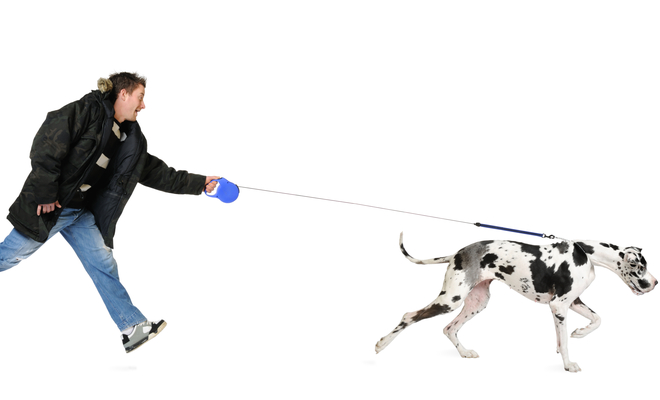
In the meantime, I have adopted my own three-part Plan A as a response: (1) Look for an affordable organic dog food that limits glyphosate exposure at harvest, (2) Continue to tinker with probiotics that can help get my dog back on track, and (3) Try to keep him out of the neighbor’s cat box.
Bees, look out for them please.
Honey bees are disappearing. While trying to stay on top of the recently observed reduction in my garden’s pollinator friends, the honey bees, I ran into a March 2017, Discover Magazine article entitled “Buzzkill” by Steve Volk. (This title alone moved me to read further and faster.)
The author visited an agricultural center in the mountains of northern Utah and reported some alarming observations that dovetail into my recent article.
- Simply stated: Honey bees are disappearing.
- The trouble started 10 years ago.
- Bee colony losses can sometimes reach 50 percent annually.
- Queen bees only survive a third of their normal life span.
- Bees are dying, and the ones that live are weakening.

